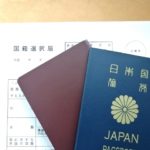Requirements for applying for naturalization in Japan │ Differences between regular, simplified and extraordinary naturalization
Foreigners can be naturalized in Japan if they meet the six requirements set forth in the Citizenship Law. However, there are certain relaxations for spouses and children, and permission may be granted even if age and residence status are insufficient.
Below, the types of naturalization applications are divided into three types and the conditions for each type are explained below.
[In the case of regular naturalization] Requirements for the naturalization application
Foreigners who come to Japan to work or immigrate may apply for a procedure called regular naturalization. The application is approved if the following six requirements are met.
Address requirements (Article 5.1.1 of the Nationality Law)
The first condition is that you have had an address in Japan for more than 5 years at the time you apply for naturalization.
Valid residence status is required for the entire period of residence, and even a one-time overstay or illegal employment may result in rejection.
Ability requirements (Article 5.1.2 of the Nationality Act)
The second requirement is that you have reached the age of majority under Japanese law.
The age used to be over 20, but the law was amended on April 1, 2022, and now you can apply for naturalization at the age of 18.
Good conduct requirements (Article 5.1.3 of the Citizenship Law)
The third condition is the recognition of good conduct.
The presence or absence of a criminal record, the existence of a penalty that has not yet been paid off under Japanese law, tax payment status, and relations with fellow citizens are all evaluated individually.
Requirements for subsistence (Article 5.1.4 of the Nationality Law)
The fourth requirement is that you have sufficient income, assets, and abilities to live a stable life without having to receive welfare in Japan.
Since income is determined on a household basis, it is considered sufficient even if the applicant is a full-time housewife and can live on her spouse’s salary.
Requirements to prevent dual citizenship (Article 5.1.5 of the Nationality Law)
The fifth condition is the revocation of the original citizenship if the application for naturalization is approved.
However, if you cannot revoke your foreign citizenship immediately due to unavoidable circumstances, you can get a grace period by explaining the circumstances.
Conditions for compliance with the Constitution (Article 5.1.6 of the Nationality Law)
The sixth requirement is that you do not engage in violent activities against the Japanese government or society.
In other words, there is no problem if you do not have a relationship with, have not joined, and have not founded an organized crime organization.
(In the case of simplified naturalization) Conditions for applying for naturalization
Permanent residents of Japan and persons who have a certain degree of kinship with other Japanese nationals may apply for “simple naturalization" under certain conditions. The content of the relaxations varies depending on the applicant. Articles 6 to 8 of the Nationality Law stipulate the following.
Persons born in Japan [Article 6 of the Nationality Law]
The following persons may apply for naturalization approximately three years after they begin residing in Japan, as the longevity requirements for their address have been relaxed.
- Natural children of a person who has lost Japanese citizenship
- Persons born in Japan
- Persons who have a natural parent born in Japan
- Persons who have lived in Japan for more than 10 years
Spouse of a Japanese citizen [Article 7 of the Nationality Law]
The spouse of a person who holds Japanese citizenship may apply for naturalization even if they are under the age of majority, provided they have had an address or residence in Japan for at least three consecutive years. After more than 3 years of marriage, the address requirements are further shortened and you can apply in your first year of residence.
Child of a Japanese citizen [Article 8 of the Nationality Law]
For a child of a Japanese citizen or a stateless person born in Japan, the address, ability, and livelihood requirements are relaxed. Minors and persons dependent on their parents may also apply for naturalization (see below for the target group).
- A natural child of a Japanese citizen who currently has an address in Japan
- A child adopted by a Japanese citizen before attaining the age of majority who has had an address in Japan for at least one year
- Those who have an address in Japan even if they have lost Japanese citizenship (* except if they have obtained it through naturalization)
- Those born in Japan who are stateless by birth but older than 3 years
What is extraordinary naturalization?
There is also an approval process for naturalization applications called “extraordinary naturalization", but you cannot apply for it yourself. This refers to the case where a foreigner who performs a special service in Japan can be naturalized with the approval of the Diet.
Suppose the applicant himself obtains Japanese citizenship by regular naturalization and his spouse and children obtain Japanese citizenship by simplified naturalization.
It can be assumed that if the applicant themselves obtains Japanese citizenship through regular naturalization, their spouse and children can obtain Japanese citizenship through simplified naturalization.
The most important points of the application for naturalization
Many documents are required for the naturalization application, and it usually takes about a year to be approved. In addition to all the above conditions, you should pay attention to the following points to avoid errors in your application.
Simplified naturalization requires a minimum level of Japanese language proficiency
For simplified naturalization of a spouse/child of a Japanese citizen, “Japanese language skills that do not interfere with daily life" are required in addition to the conditions required by law. Their application will be approved only if they can read and write to the extent necessary for their daily life and can perform simple procedures without an interpreter.
The documents required are different for each applicant
The decision to approve or deny an application for permission to naturalize is made based on each person’s individual situation. Therefore, the documents to be submitted are also different for each applicant and it is common to prepare them in consultation with the Legal Affairs Office.
In some cases, you may need to supplement your documents at your discretion to make them admissible or look for alternatives for documents that are difficult to obtain. It may be very difficult if you are trying to manage the process on your own while meeting your work and home obligations.





















